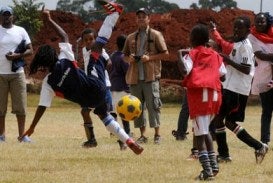 Throughout the slums of this world, poor children are dreaming of becoming football stars and playing in the World Cup. Some of them from Kibera—Kenya’s largest slum—had a shot last weekend, when the International School of Kenya hosted the third “Mini World Cup”.
Throughout the slums of this world, poor children are dreaming of becoming football stars and playing in the World Cup. Some of them from Kibera—Kenya’s largest slum—had a shot last weekend, when the International School of Kenya hosted the third “Mini World Cup”.
The event involved more than sixty teams made-up of Kenyan and international children from all walks of life. Two teams from Kibera made it to the top eight teams of the tournament, keeping their dream alive to win the “Cup” in one of the next years. The great thing about football is that all teams, no matter what their social background, have an equal opportunity to win. They start on a level playing field, and they all play by the same rules. When the final whistle blows, there is no reason why one of the teams from Kibera should not lift the Mini World Cup next time, just as Ghana’s Black Stars overcame Team USA in the 2010 World Cup, despite the huge disparity in wealth between the two nations.
In economic development, the equivalent of having a level playing field is equality of access to basic services. Most successful countries have consistently delivered basic services to their entire population, giving their children a good chance of progressing, no matter what their parents earn and where they live. Kenya’s new system of devolved government holds a great promise: equal opportunities for all Kenyan children whether they come from Machakos or Marsabit, Kwale or Kitale. But is this grand vision a possibility or a mere mirage? Will services improve as a result of devolution or actually decline? Will county governments translate local preferences into improved policies, or will corruption be decentralized and multiplied by forty-seven?
The starting point is challenging because Kenya is a highly unequal country. The recent World Bank Kenya Economic Update and its companion County Fact-sheets produced by the Commission on Revenue Allocation, contained some shocking statistics. While more than eight in ten children in Mombasa are well nourished, only one in five is of adequate height-for-age in Wajir county, signaling chronic malnutrition. In Kirinyaga, eight in ten children are born at a health facility, but this ratio declines to one in ten in the remote Mandera county, and a dismal one in twenty in Wajir. The situation in education is slightly better (thanks largely to Kenya’s free primary education policy), but significant differences still creep in at the secondary level, where children in the cities have a much greater chance of advancing, than those in rural areas.
Given these spatial inequalities and the natural concentration of economic activity around Kenya’s main cities, here are three thoughts on making this country more equal and prosperous.
First, development can be inclusive and broad-based, even if economic activity remains concentrated, which it is in almost all countries in the world, especially successful emerging economies. While all areas may not have similar potential to become centres of economic development, all Kenyans should be entitled to the same level of basic services and to equal opportunities, to lead healthy productive lives. While it’s unlikely that Kenya’s first major car factory will chose to operate from Marsabit, there is no reason why a child born in Marsabit, or any other part of Kenya for that matter, should not have the same chances of getting a good education, and growing up healthy, so that he/she could eventually work in that factory, which is more likely to be located around Nairobi or Mombasa.
Second, this means that, over time, extra resources will need to be channeled to these remote areas, to allow them to catch-up with the service delivery standards enjoyed elsewhere, and to account for the fact that services are more costly to provide in remote places. Kenya can be a more equitable society if the state uses the national income—mainly generated in Kenya’s economic heartland—to help remote regions to close the gaps in access to health, education, water and other key services.
Third, international experience suggests that devolution is no magic bullet; it must be well designed and implemented. While devolution is seen by many in Kenya as a direct response to historical patterns of neglect, it is by no means certain that it can radically alter these imbalances quickly in-and-of itself. In fact, in the short run, devolution could even exacerbate disparities, as the experience of the United Kingdom illustrates. Over the last decade, powers were devolved to Scotland, Wales and Northern Ireland. The resulting service delivery outcomes were very different across each of these regions: in math for instance, the performance of Welsh children fell dramatically, while their Scottish peers excelled. Citizens will need to demand that their local leaders deliver, to ensure that their counties do not fall behind.
Living a decent life is a basic human right which is at the heart of Kenya’s new constitution. But beyond this universal non-negotiable minimum, the promotion of greater equity should focus on opportunities not outcomes. That means working towards a level playing field through more equal distribution of resources, having clear rules of the game in terms of the legal and policy framework, and having a firm but fair referee, to ensure minimum standards of service delivery for all Kenyans, whatever their county. It will take time to build this new more equitable Kenya, but hopefully the children who will be part of future Mini World Cups will see this dream materialize in their lifetimes. They can prove that in this new interconnected knowledge world of ours, what’s in your brain and in your heart matters more than what you have in your pockets.


Join the Conversation